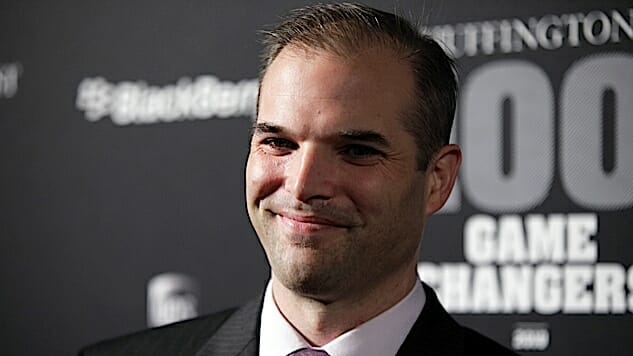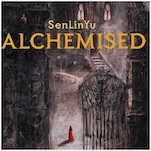Matt Taibbi’s Hate, Inc. Is a (Mostly) Brilliant Indictment of American Media
Photo courtesy of Getty
When American journalism finishes its own Book of Revelations, Matt Taibbi’s name will be on the title page. Until the last trumpet sounds, he’s assured of readership. The man’s been writing postmodern New Journalism for the last twenty-odd years, at a string of impressive publications. Most recently, and most famously, he’s occupied the Hunter Thompson berth at Rolling Stone. During the last two elections, Taibbi returned to glory what P.J. O’Rourke so dismally stained. After overseeing the rhetorical execution of famous mustache-bearer Tom Friedman, Taibbi became the Internet’s roving gadfly for everything worth getting mad about. If it was important enough to risk stroking out over, Taibbi made sure to comment on it. Like Paste itself, Taibbi was on the right side of the Russiagate story (which, between you and me, was not a hard call to make).
Russia, Trump, and the media hellscape are the subjects of Taibbi’s latest book, a bracing piece of media analysis titled Hate Inc.: How, and Why, the Press Makes Us Hate One Another. Taibbi is publishing his latest tome online. The chapters come out serially, in the style of Dickens, Thackeray, or the letters of Jack the Ripper. And much like the prose works of the Unabomber, Taibbi’s writing will be studied by scholars, superfans, and deranged Internet commenters for probably the next hundred years, or however long it takes the sea to claim our bodies.
Taibbi’s book isn’t done yet, of course—several chapters remain unposted. However, not mentioning Hate, Inc. in Paste felt wrong, like inviting the Pac-Man over and not giving him ghosts to eat.
Here’s Taibbi’s message in one paragraph: In the old days, the media was official, bland, boring. The news manufactured consent, and represented the ruling consensus. The Internet, the New Economy, and the Nineties changed that. New media—cable news and clickbait sites—upended everything, including our politics and our brains. Trump is the symptom of this, not the cause. Media is entertainment, and is designed to make us hate one another. Hate’s a profitable business, by the way. If we don’t do something about it, the roof will collapse on our heads.
“If you hate the media and want a firsthand account of why it sucks so much, this book will be for you. It’s designed to help people see through the hundreds of gadgets and tricks people in our business use to push your opinions one way or another. The idea is to unspool these evil secrets just as the 2020 election – with its inevitable onslaught of media deceptions – begins.”
What makes Taibbi’s book different from every other Very Concerned media pundit? Three features.
First, books by media people follow a typical pattern. There’s an introduction where the author basically says: Isn’t Trump horrible? How could matters have gotten this way? This intro is usually followed by a couple of chapters of potted history, a chapter about Facebook/Twitter, a chapter plugging the author’s favorite podcasts, segue to the end. See, the media has a nice story it likes to tell about itself and its past, when everything was in richer colors and Life Was More Profitable. This rosy-hued scenario is better known by its scientific name, shameless lies. In Hate, Inc. Taibbi is irreverent enough to dispute this story, and call it for what it is: a self-flattering fantasy.
Second, Taibbi is honest, intelligent, and observant enough to see class interest, including his own. He understands the craven and managerial character of modern American journalism. He’s willing to spend page upon page admitting its problems.
Third, on any subject, Taibbi is a delight to read. He’s a figure of large courage and considerable brio. Except with one notable exception, he never sends up a mainstream idea but to puncture it a few paragraphs later. When he scolds Maddow, for instance, he tells you that he and Maddow are friends. When he criticizes Maddow, he informs you that his buddies in New York are angry at him for it. Every page is like this.
I mentioned the first benefit of Hate, Inc.—the fact that it disputes the official story that media tells itself. Taibbi doesn’t wait around on the critique. He dives right in, during the introduction, when he’s interviewing Noam Chomsky:
The main idea in Manufacturing Consent is basically that idea: that it looks like we have a vigorous system of independent journalists, but the debate has been artificially narrowed. … basically you’re talking about the same instinct for conformity, the inability to understand that you’re working within a predetermined framework.
Taibbi tells his story of growing up in a journalistic household. His Dad was in Seventies news, so Taibbi’s views were typical. Then he read Herman and Chomsky’s Manufacturing Consent, the greatest book ever written on American journalism.
The book’s central idea was that censorship in the United States was not overt, but covert. The stage-managing of public opinion was “normally not accomplished by crude intervention” but by the keeping of “dissent and inconvenient information” outside permitted mental parameters: “within bounds and at the margins.” The key to this deception is that Americans, every day, see vigorous debate going on in the press. This deceives them into thinking propaganda is absent. Manufacturing Consent explains that the debate you’re watching is choreographed. The range of argument has been artificially narrowed long before you get to hear it. This careful sham is accomplished through the constant, arduous policing of a whole range of internal pressure points within the media business. It’s a subtle, highly idiosyncratic process that you can stare at for a lifetime and not see.
The original title for Taibbi’s book was Thirty Years After Manufacturing Consent, How Mass Media Still Keeps Thought Inbounds.
There are no editors who come blundering in, red pen in hand, wiping out politically dangerous reports, in the clumsy manner of Soviet Commissars. Instead, in a process that is almost 100% unconscious, news companies simply avoid promoting rabble-rousing voices. Advancement is meanwhile strongly encouraged among the credulous, the intellectually unadventurous, and the obedient.
This is where most writers would stop. But we’re dealing with the man who lanced Friedman, and so:
As I would later discover in my own career, there are a lot of C-minus brains in the journalism business.
Under this theory, Taibbi notes, “a Polish priest murdered by communists in the Reagan years” is a victim whose story is worth covering, but “rightist death squads in U.S.-backed El Salvador killing whole messes of priests and nuns around the same time” was deemed less relevant. Taibbi understands the fix: Once you control the questions, the answers don’t matter.
In the War on Terror period, the press accepted blame for having lost the last big war and agreed to stop showing pictures of the coffins coming home (to say nothing of actual scenes of war deaths). We also volunteered to reduce or play down stories about torture (“enhanced interrogation”), kidnapping (“rendition”), or assassination (“lethal action,” or the “distribution matrix”).
Hate, Inc. is especially brilliant when Taibbi calls out his colleagues. Take the chapter on Iraq, which should be required reading in all three remaining journalism schools. As Taibbi points out, this doesn’t take a lot of digging. If you want to indict the American media class, all the evidence is right there, online:
In the popular imagination, the case for invading Iraq was driven by Republicans and one over-caffeinated New York Times writer, Judith Miller. But the blue-state intelligentsia, especially the Upper West Side/Georgetown sect of northeast corridor pundits mostly still in place, also hyped Bush’s war. Richard Cohen of the Washington Post said “only a fool – or possibly a Frenchman” could reject the WMD case. #Resistance hero David Remnick of the New Yorker chipped in for invasion with “Making the Case.” Jonathan Chait of New York, a human wrongness barometer if there ever was one, supported the invasion in ’03, then wrote a snippy column ten years later warning that “sweeping out… the existing thought, and existing thinkers” who’d erred on Iraq (read: him) would be a “myopic” response.
By Iraq, of course, the media had changed. Cable news rose in power as the Soviet Union declined. The press had been a gray-toned official story bureau for most of the 20th century. Americans decided to stay forever online. The press responded in kind. Reading became sharing, features became takes, scandal become clickbait, popularity was rebranded as viral, and everything eventually became content.
The meat of the book deals with the Press in the Age of Trump. Taibbi has words on that score. When the media pushed the likability narrative during the 2016 campaign (and every campaign before that), they were wrong. When they covered Trump as a dark horse, or when they covered him as a bad hombre, they were still covering Trump, and that was wrong. The media helped make Trump, and the Fourth Estate had a disturbing symbiosis with Trump from day one.
None of this is groundbreaking insight, by the way. Taibbi’s clear on that point. In every election, The Reporters and The Candidates are all but married to each other. Taibbi’s stories about life in the press bus are delightful. For instance: “On my first-ever day on the trail for the magazine in 2004, an unnamed reporter called Howard Kurtz at the Washington Post to complain—this really happened—because I’d broken an unwritten rule by taking video of the press section without permission.” These anecdotes, and Taibbi’s reaction to them, are worth the price of admission. His insights on media complicity will become the gold standard. Of the 2012 election:
While explaining how the press became white-collar, and lost touch of economic realities, Taibbi notes:
While sportswriters for a while remained hardscrabble, cigar-chewing types who hammered team owners and managers for every tiny mistake, political reporters became professional apologists, constantly telling us how hard it is for politicians to win elections and run things. … Leadership was hard! If a candidate had to fib or back off a campaign promise, the new generation of scribes explained a politician’s job was to accept the “burden of morally ambiguous compromise.” … By that time in history, to even get on the plane as a reporter, you had to jump over a slew of cultural/financial obstacles.
Eventually, Taibbi gets to Russiagate. The media missed the boat on that story—missed an armada, as it turns out. They took an obvious conspiracy theory and sold it as true science.
Taibbi sees the media’s gullibility on the Moscow Conspiracy as an overreaction. Basically, it was their apology for their role in making the Orangeman president. Last summer, Jim Rutenberg wrote a Times column calling the press to account. Rutenberg said the media was obliged to follow an adversarial path during the Orange Presidency. The piece was widely shared, and became a new gospel to Amercan reporters.
In reality, this column helped plant the seeds of the infamous symbiosis of today. What Rutenberg really meant by giving up “balance” wasn’t going after Trump more – we already were calling him every name in the book – but de-emphasizing scrutiny of the other side.
This leads into the weakest part of Taibbi’s book. Taibbi’s a thousand percent right on the fatuousness of the media class. What is less delightful, and less convincing, is Taibbi’s love for the mythical Reasonable Center.
There’s a strange phenomenon that happens to the edgiest pundits. Your Taibbis, your Hunter Thompsons, your Tom Wolfes, your Michael Lewises, your Gail Sheehys, your Menckens. Doesn’t matter how great they are. The fact is, every political writer of genius has at least one lazy, insipid belief in their soul. Mencken was a garden-variety anti-Semite and played in an oompah band. Thompson’s ideas of drug freedom were basically Reddit-tier. Lewis’ ideas for financial reform are appallingly mild. And Taibbi, I’m sad to say, is an epic purveyor of Both Sides Do It, Let’s Rescue The Precious Discourse. You hate to see it.
Taibbi’s right about Maddow selling out. But did he really need to spend a section of his book both-sidesing both MSNBC and FOX? MSNBC is merely a dishonest business proposition. FOX news is a state propaganda organ, founded by a probable sex criminal. Hannity’s Two Minute Hate is not the same thing as Maddow’s patronizing Russia grift. No rational mammal pundit can watch conservative media, and not come away thinking anything but the Right is completely, irreparably insane. It’s like claiming Goldman Sachs is the same as the SEC. No.
Unfortunately, Taibbi has spent too much time on the coast. Awareness of the media bubble does not save you from the swallowing the assumptions of the media bubble. And although he’s an honest man with sharp judgment, Taibbi’s fallen prey to the usual anger is bad, division is bad, partisanship is bad line we get peddled to us by the ruling class.
Y’know what? Serenity in times of injustice is overrated. Guess who else liked peaceful crowds? Kings and warrior popes. People should be upset. It’d be better if Americans were angry at the right targets, but their reactions are sensible given the state of our government and our society.
There’s a lot of this kind of stuff:
There will be Democrats who protest: but Republicans are racist! It’s right to be organized in solidarity against them! Donald Trump is evil! Rachel is right! That’s why she doesn’t belong in the same discussion as Hannity, a bully who reportedly has a history of accusing saying homosexuality is practiced by people committing “deviant, twisted acts.” She’s never done anything like that! Okay. But are all Republicans alike? Are they caricatures? How many people are defined by something they do once in four years? (Or don’t do at all – remember, non-voters are significantly more numerous than either faction.) … The implied context of both shows is a never-ending culture war. Each cherry-pick that day’s news to see, gotcha, whose side did better today.
By the thousand-ton throne of God, I am tired of this. Listen, pundit. When you tell the rest of us the other side is human, that’s not news to the public. Most Americas understand this point. We get it. We really do. We’re not the squealing hogs you imagine we are. Most adults comprehend that people who are wrong are still human. “The Nation At War With Itself” is a story beloved by media types and country-fair social scientists like Ben Sasse. In fact, most Americans agree on the key points. Here’s one of our biggest shared beliefs: the elite of this country are scum.
Taibbi is nervous about this:
The essence of hate is fear. It’s the key lesson in To Kill a Mockingbird: we fear what we can’t see. We tell stories about what’s on the other side of the wall. Harper Lee describes how the town of Maycomb despises Boo Radley, spinning legends about Boo coming out at night to kill pets.
A Mockingbird reference! “How are you doing, fellow kids?” This is the distilled language of condescension. The Taibbi-Sasse school of Reasonable Discourse gets my hackles up, and everything else up, too. See, those of us who treat politics as an actual area of concern tend to see this concern for the Discourse as the most hall-monitor horseshit imaginable.
In reality, being involved in politics is simple. You decide what you think is right, and push like hell for what you believe in. If you have friends or colleagues on the other side, you do one of two things. You either persuade them—or if you can’t, you come to an understanding with them while not giving up your beliefs, and not apologizing for them. That’s how American adulthood works. It’s how American politics works. Anyway, if you care about the state of the world, the World of Manners (or passing in polite company) is not a huge concern.
If you’re screaming about Rude Activists or the dying of American Civility, what can I tell you? Either you’re a genuinely nice person, or you’re one of the martini crowd in the good seats watching humanity struggle from afar. If you’re the latter, how did you get to be this way, and why aren’t you ashamed of yourself? The Noble Discourse Horserace guys bear the same relationship to political struggle that sportswriters do to athletes.
This both-sides garbage is how we got here in the first place. Saying both sides are equivalent doesn’t make you some low-body-fat philosopher king. It just makes you look like a gullible hack who’s privileged enough to not care when the Enemy of the Moment gets carted away. Stop loving the Discourse and love justice more.
That aside, Taibbi has written a hair-raising expose with his usual verve and insight. You don’t read Taibbi for deep philosophy, or anthropology with curses. Or for history. You consume Taibbi for the profane tell-all wit. Y’know, the kind of truth you’d get from your weird friend who was already doing whippets in junior high:
The “fuck it” vote felt like a huge part of Trump’s win. Lots of people recognized Trump was a jackass and that’s actually why they voted for him. As has been reported many times, people who disliked Trump and Clinton were maybe his most important constituency.
Ripping through the chapters is a bit like dousing yourself with wasabi and a hundred pounds of Adam Curtis documentary VHS tapes. You begin by thinking: What the hell are we doing here, and end a couple of hours later staring at the wall, considering if any of this—the spectacle, the Presidency, the Fourth Estate, punditry, the world—is even real. Taibbi isn’t done yet, and neither are we. We have another year and a half before Election Day. Hallelujah.







































